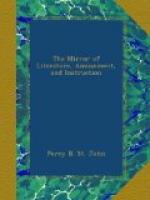“The Landers, after having reached Youri, embarked in a canoe on the Niger, or, as it is called there, the Quarra, and came down the stream until they reached the sea, in the Bight of Biafra. The branch by which they came to the coast is called the Nun, or Brasse River, being the first river to the eastward of Cape Formosa. On their way down the river they were attacked by the Hibboos (a fierce nation that inhabit its banks), and made prisoners, or rather captives; but the King of Brasse happening to be in that country buying slaves, got them released, by giving the price of six slaves for each of them. In the scuffle that ensued at the time they were taken, one of them lost his journal.”
“Whilst at Youri they got the Prayerbook that belonged to Mr. Anderson, the brother-in-law and fellow-traveller of the celebrated Mungo Park. They were upwards of a month at Fernando Po, whence they embarked, about ten days ago, in an English merchant-vessel bound to Rio Janeiro, on their way to England. From their taking that circuitous route, I am in hopes that this will reach you before they arrive, by which you will probably have it in your power to give the first news of this important discovery.”
“I do not recollect of any thing else to acquaint you with that is worthy of notice; and even if I did, I have no time to mention it, as the boat by which I send this (to the vessel) is just this moment ordered away.”
“I must therefore bid you adieu for the present; and believe me, dear sir, yours very sincerely.”
“ALEXANDER FISHER.”
* * * * *
THE GATHERER.
A snapper up of unconsidered trifles.
SHAKSPEARE.
* * * * *
EPITAPH
On a Porter who died suddenly under a load.
Pack’d up within these dark abodes,
Lies one, in life inur’d to loads,
Which oft he carried ’tis well known,
Till Death pass’d by and threw him
down;
When he that carried loads before,
Became a load which others bore
To this his inn—where, as they
say,
They leave him till another day.
* * * * *
ROYAL OATHS.
In former times sovereign princes had their favourite oaths, which they made use of on all occasions when their feelings or passions were excited. The oaths of the English monarchs are on record, and a list of them might easily be made, by having recourse to the ancient writers of our history, from the conquest to the reign of Elizabeth, who did not scruple, pia regina, et bona mater, of the Church of England as she was, to swear by “God’s wounds,” an oath issuing at this time frequently from vulgar mouths, but softened down to “zounds.”




